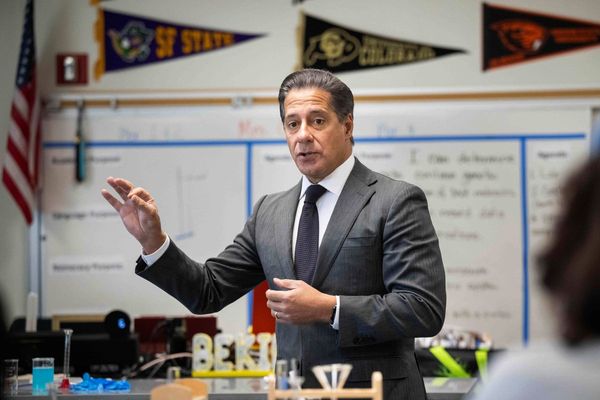
A woman caring for sick family members has told the Victorian government that her “mental health is at an all time low” as the latest wave of Omicron spreads, with few public health restrictions in place to protect those most vulnerable to the virus.
In a letter to Victoria’s health minister, Mary-Anne Thomas, the woman described the stress of caring for her three-year-old son who was born premature and has respiratory vulnerabilities, as well as her 80-year-old mother, who has just been diagnosed with advanced neuroendocrine cancer.
“We all live together,” the woman, who works in a health role and can not be named publicly, wrote.
“Every aspect of my mother’s diagnosis, prognosis, and treatment is being delayed by staff shortages in the healthcare system, especially at the Peter Mac Cancer Centre where they have told me they regularly have up to 50% of staff unable to work due to the current Covid/flu surge.
“My mum is likely to have a shortened life because of this situation as her cancer was so advanced when they finally diagnosed it, and her treatment continues to be delayed.”
She described how her son, too young to be vaccinated, can’t go to childcare or even indoor playgroup as the risk of bringing home Covid or flu to his grandmother “or to me, as full-time carer to them both, is too great”.
“His own medical vulnerabilities terrify me as our GP is regularly overworked … and the Royal Children’s Hospital ED is almost constantly extremely busy, and sometimes warning they are all but unavailable.”
The woman, who lives in Princes Hill in Melbourne, told Guardian Australia she is frustrated that despite hospitals facing staff shortages and bracing for thousands more Covid and flu hospitalisations in coming weeks, the health minister ignored advice from government health advisers to reintroduce mask mandates in crowded indoor settings.
She urged Thomas to follow the advice of the chief health officer and other health experts.
“Please, please, please do more to support our healthcare system and limit the next wave of Covid,” she wrote to Thomas. “My family is desperate and I need proof our elected representatives care about us.”
The general manager for people living with blood cancer at the Leukaemia Foundation, Kathryn Huntley, said while the majority of people have experienced more freedom with the lifting of Covid-19 regulations this year, vulnerable Australians “and their feelings of isolation, uncertainty and anxiety have only increased with many retreating further as they try to manage their health and avoid infection”.
“The Leukaemia Foundation is continuing to do everything we possibly can to protect the people we support, and with flu season upon us and Covid-19 cases rising daily, blood cancer patients are reaching out for support and trusted information, and we want to ensure them we are here to help,” she said.
The president of the Australian Medical Association, Dr Omar Khorshid, on Tuesday urged politicians to follow the advice of their health advisers as Covid spreads, including any advice for the reintroduction of masks in high-risk settings. Khorshid said the most vulnerable are already being affected by the removal of medicare-subsidised extended telehealth consultations.
“These changes undermine the ability of patients to access their doctors, and in particular for GPs to prescribe antivirals for Covid-positive patients and will lead to costs elsewhere in the health system, including in overstretched hospitals,” Khorshid said.
Program director of infectious diseases and immunology at Griffith University, Prof Nigel McMillan, said the federal government also had not gone far enough to improve access to life-saving antiviral drugs to the most vulnerable. While he welcomed broadened eligibility criteria announced at the weekend, McMillan said pressures on GPs meant vulnerable patients who are elderly or with underlying health conditions might still find it difficult to get an appointment and pick up a prescription.
He believes pharmacists should be given approval to prescribe the antivirals directly to vulnerable people with Covid-19, which he said would ease pressure on GPs.
“GPs are obviously incredibly busy right now,” he said. “The antivirals come with some important drug interactions, and pharmacists are experts at talking people through those interactions.”
McMillan added that it was “mistake” for the government to end the program which provides 10 free RATs every three months to people with a concession card.
“I’d like them to rethink that because ultimately, we have to lower the bar in terms of making sure people can test readily and easily, particularly for the vulnerable, who need to return a positive test in order to get access to antivirals which need to be administered within the first few days of symptoms. We can’t make it difficult for those people to get tested and treated.”







